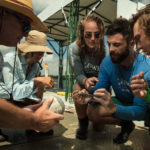Symposium to promote healing for deployed U.S. military and families
Every day a soldier, marine, sailor or airmen is directly affected by war. Equally affected are the families and loved ones of military members serving their country through multiple deployments. Taking steps to expand the knowledge of community-based mental health professionals, government and uniformed health care providers and others interested in deployment or behavioral health, the University of West Florida Center for Applied Psychology and Naval Hospital Pensacola will co-sponsor a symposium, "The Hidden Casualties of War: Promoting Healing and Resiliency for U.S. Service Members and their Families" May 8 and 9 at the UWF Center for Fine and Performing Arts, Building 82. The cost of the symposium is $245 per person. Registration closes May 1.
Every day a soldier, marine, sailor or airmen is directly affected by war. Equally affected are the families and loved ones of military members serving their country through multiple deployments. Taking steps to expand the knowledge of community-based mental health professionals, government and uniformed health care providers and others interested in deployment or behavioral health, the University of West Florida Center for Applied Psychology and Naval Hospital Pensacola will co-sponsor a symposium, “The Hidden Casualties of War: Promoting Healing and Resiliency for U.S. Service Members and their Families” May 8 and 9 at the UWF Center for Fine and Performing Arts, Building 82. The cost of the symposium is $245 per person. Registration closes May 1.
“It’s been a very exciting opportunity for the UWF Center for Applied Psychology to collaborate with the Naval Hospital Pensacola in particular, their Department of Deployment Health and Wellness,” said Laura Koppes, chair of the Department of Psychology. “Through this symposium, military and civilian experts will give our community professionals the knowledge they need to help these individuals.”
The two-day symposium will include a review of the deployment cycle and its impact on the psychological health of military personnel and their family members. Nationally recognized experts will discuss evaluation and treatment strategies for several deployment related topics including: “Depression,” “Traumatic Brain Injury,” “Sexual Assault,” “Helping Children to Be Resilient,” “Counseling Bereaved Military Families,” “Post-Traumatic Stress Disorder” and “Counseling Guardsmen and Reservists in Community Settings.”
“A current concern is that individuals are deployed multiple times,” said Koppes. “Preparing for deployment, going through deployment and coming back from the deployment are phases that not only affect the military service members, but their family and children.”
“Post Traumatic Stress Disorder,” just one example of the several sessions in the symposium, will help participants understand the differences between PTSD, Acute Stress Disorder, Traumatic Stress and Combat Stress Reaction, as well as differential risk factors and prognostic factors for traumatic events versus PTSD, as well as five evidence-based treatments for PTSD.
Presenters for the symposium are: Col. Charles Engel, M.D., M.P.H., Department of Defense Deployment Health Clinical Center, Walter Reed Army Medical Center and Uniformed Services University; Louis French, Psy.D., Defense and Veterans Brain Injury Center, Walter Reed Army Medical Center; Sue Ann Garrison, Ph.D., Gulf Coast Veterans Health Care System and Mental Health Clinic; Ronald Palomares, Ph.D., American Psychological Association; Lynne Peralme, Ph.D., Birmingham Veterans Center; Bithiah Reed, Ph.D., Center for Deployment Psychology; Kenneth Reich, Ed.D. and Jane Darwin, Psy.D., Harvard Medical School and Captain Robert Koffman, M.D., M.P.H., Combat and Operational Stress consultant, Bureau of Medicine and Surgery, U.S. Navy.
For express enrollment and information on the availability of continuing education credit, visit ContinuingEd.uwf.edu or call (800) 710-3233.
By Megan Tyson, University Marketing Communications


